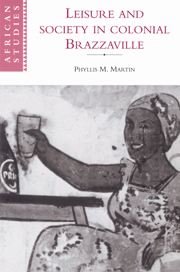Book contents
- Frontmatter
- Contents
- List of plates
- List of maps
- List of tables
- Acknowledgements
- List of abbreviations
- Introduction
- 1 An African crossroads, a frontier post and a colonial town, c. 1880–1915
- 2 Taking hold of the town, c. 1915–1960
- 3 The emergence of leisure
- 4 Football is king
- 5 About the town
- 6 Dressing well
- 7 High society
- Conclusion
- Notes
- Bibliography
- Index
- Titles in the series
Introduction
Published online by Cambridge University Press: 09 November 2009
- Frontmatter
- Contents
- List of plates
- List of maps
- List of tables
- Acknowledgements
- List of abbreviations
- Introduction
- 1 An African crossroads, a frontier post and a colonial town, c. 1880–1915
- 2 Taking hold of the town, c. 1915–1960
- 3 The emergence of leisure
- 4 Football is king
- 5 About the town
- 6 Dressing well
- 7 High society
- Conclusion
- Notes
- Bibliography
- Index
- Titles in the series
Summary
In 1936, a controversy erupted over Brazzaville football. The subject of debate was whether players should wear shoes in matches or play barefooted. The European administrators of the Native Sports Federation decreed that wearing shoes encouraged violence on the field, that Africans were unsportsmanlike, and that they must, therefore, play barefooted. Some team captains, who were also part of the urban elite and wore shoes on a daily basis, were so outraged that they wrote to the Governor-General of French Equatorial Africa (AEF) asking him to reverse the ruling, which, on the advice of sports administrators, he did not. This shoes controversy brought to a head the already contentious relationship of European sports organizers with players in Bacongo and Poto-Poto, Brazzaville's two African districts. When the team leaders organized a boycott, the official football league collapsed. The Catholic mission, old adversaries of the administration for the hearts and minds of African youth, quietly built up their teams from disaffected players. Some older players simply retired from league play but continued to participate in informal matches in their spare time, as they had done since they were youngsters in the city streets. Young players and those too poor to own shoes had little interest in the conflict and went on playing barefooted, as they had always done.
This incident, preserved in a file in the Congolese National Archives under the rubric of ‘Petitions to the Governor-General’, captures the essence of this book which reconstructs the daily-life history of an African colonial town through exploring how the inhabitants created, contested and occupied their leisure time.
- Type
- Chapter
- Information
- Leisure and Society in Colonial Brazzaville , pp. 1 - 11Publisher: Cambridge University PressPrint publication year: 1996

